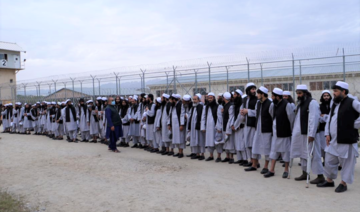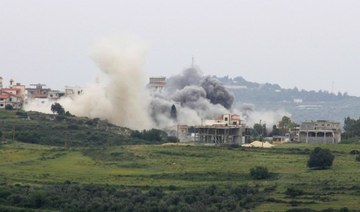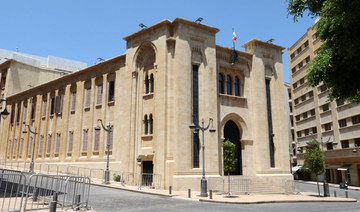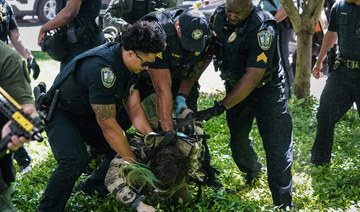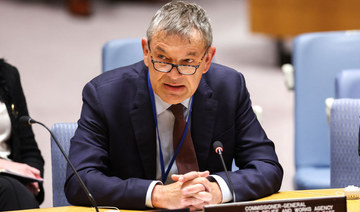KABUL: The Afghan government announced it would free 900 prisoners on Tuesday, its single largest prisoner release since the US and the Taliban signed a peace deal earlier this year that spells out an exchange of detainees between the warring sides.
The announcement came as a three-day cease-fire with the insurgents draws to an end. The Taliban had called for the truce during the Muslim holiday of Eid Al-Fitr that marks the end of the Islamic holy month of Ramadan.
There are expectations that the prisoner release could lead to new reductions in violence, and Taliban officials say they are considering an extension of the cease-fire.
A senior Taliban figure confirmed this to The Associated Press.
“If these developments, like the announcement of prisoner release continues, it is possible to move forward with decisions like extending the brief cease-fire and to move in a positive direction with some minor issues,” the Taliban official said.
The prisoners were being released from Bagram prison, where the US still maintains a major military base, north of Kabul, as well as from the infamous Pul-e-Charkhi prison on the eastern edge of the Afghan capital.
By late afternoon, the AP witnessed scores of men pouring out of the Bagram compound — presumably the released prisoners. It was not immediately possible to verify their numbers or whether they were all Taliban members.
The prisoner release is part of the US deal with the Taliban, signed on Feb. 29 to allow for the eventual withdrawal of US and NATO troops from Afghanistan, bringing to an end the country’s protracted war and America’s longest military involvement.
When the deal was signed, it was touted as Afghanistan’s best chance for peace after decades of war but political feuding in Kabul and delays in prisoner exchanges have slowed the deal’s progress toward intra-Afghan negotiations, considered the second and most critical phase of the accord.
Under the deal, Kabul is to release 5,000 Taliban prisoners while the insurgents are to free 1,000 captives they hold, mostly government officials and Afghan forces, before intra-Afghan negotiations can begin.
Afghan President Ashraf Ghani had welcomed the Taliban cease-fire announcement during the Muslim holiday.
Javid Faisal, a national security spokesman in Kabul, urged the Taliban to extend the cease-fire and said the government would release 900 prisoners on Tuesday.
That would bring to 2,000 the number of Taliban prisoners released so far under the US-Taliban deal. The Taliban say they have released 240 of captives they held.
However, the Taliban have yet to confirm whether those released so far by the government were among the 5,000 names the insurgents had given US negotiator Zalmay Khalilzad, the architect of the Feb. 29 deal.
A second Taliban official told the AP that those released so far were n fact on the Taliban list of demands, including the uncle of Taliban chief Hibatullah Akhundzada. Key in deciding which names would appear on the list was Mullah Nooruddin Turabi, a senior figure who had recently recovered from COVID-19, the illness caused by the coronavirus.
Turabi was the much feared vice and virtue minister during the Taliban rule, known for beating men who were found listening to music or not attending the mosque. He once slapped a Taliban commander who spoke with a woman journalist.
Both Taliban officials spoke to the AP on condition of anonymity because they were not authorized to talk to reporters.
Many Afghans have expressed frustration at the slow and often stalled peace process; many have known only conflict in their homeland for the past several decades.
“If both sides stop this war and sit at the negotiating table ... maybe my youngest children will experience a good life, which we never experienced,” said Sayed Agha, a truck driver from eastern Logar province who was wounded in April, caught in the crossfire during a battle between the Taliban and Afghan soldiers.
“I have spent my whole life in war,” said Agha, 45.
Afghan gov’t to free 900 prisoners; Taliban may extend truce
https://arab.news/686n4
Afghan gov’t to free 900 prisoners; Taliban may extend truce

- The announcement came as a three-day cease-fire with the insurgents draws to an end
150 shells hit Lebanese border towns in response to Israeli’s killing
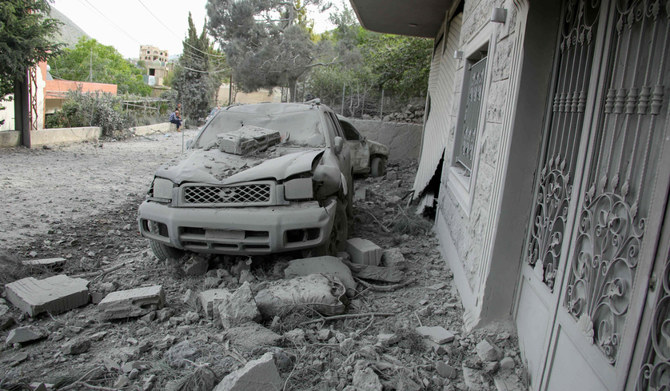
- 200 days of Israeli attacks against Lebanon have resulted in 1,359 casualties, including 344 deaths, ministry of health says
BEIRUT: The Israeli army responded on Friday to the combined operation carried out by Hezbollah in the occupied Shebaa Farms district — also known as Har Dov — with artillery shelling and airstrikes targeting the Tumat Niha area on the outskirts of Western Bekaa.
An Israeli was killed near the country’s northern border in a Hezbollah attack.
Israeli forces launched an airstrike on the outskirts of Shebaa and fired artillery shells on the outskirts of the town of Kfarchouba at dawn.
The outskirts of Shebaa, Kfarchouba and Helta were targeted with more than 150 Israeli shells.
Hezbollah members set up on Thursday night a “combined ambush of guided missiles, artillery, and rocket weapons targeting an Israeli motorized convoy near the Ruwaizat Al-Alam site, in the occupied Lebanese Kfarchouba hills.”
When the convoy arrived at the ambush point, according to Hezbollah’s statement, “it was targeted with guided weapons, artillery and rockets, destroying two vehicles.”
The party said that the Israeli army created a “smokescreen to retrieve losses.”
Hezbollah announced “targeting an Israeli force as it made it to the entrance of Al-Malikiyah site with artillery fire, and it was directly hit.”
The Israeli army confirmed the killing of a truck driver, Sharif Sawaed — a resident of Wadi Salameh — by an anti-tank shell fired by Hezbollah toward Shebaa Farms.
The Israeli army said that Sawaed was carrying out infrastructure work in the area targeted by the shell, where efforts are underway to set up a barrier on the border.
The Israeli army said that it “succeeded in retrieving the body of the dead soldier after a complex operation that lasted for hours under fire.”
The Israeli army said that warplanes later shelled Hezbollah positions in the villages of Kfarchouba and Ain Al-Tineh, a weapons depot, and a Hezbollah rocket launch pad in the Markaba area in southern Lebanon, and that two anti-tank shells were observed from Lebanese territory toward Shebaa Farms.
Israeli airstrikes led to the destruction of a house in Shebaa, two houses in Kfarchouba, and damage to more than 35 houses. One house was destroyed in Yarine, and another was destroyed in Dhayra.
Israeli artillery shelling targeted the area between the border towns of Yarine and Jebbayn.
Israeli newspaper Yedioth Ahronoth reported that the Israeli army launched an investigation into the Har Dov incident, as the engineering force was supposed to operate in the dark to avoid being targeted by Hezbollah’s missiles.
Israeli army spokesperson described what happened in the Shebaa Farms as “a difficult security incident on the Lebanese border.”
This was the first confrontation during which the Israeli army revealed details of casualties and the developments taking place at the target site.
The head of the Israeli Metula settlement council said: “It is insane how we lose houses and infrastructure every day,” adding that “Hezbollah is systematically and deliberately hurting the people of the north by doing so.”
He said that Hezbollah had “successfully deepened the security belt here after it made us flee the northern settlements.”
The Israeli army’s radio station has reported the death of 20 settlers on the Lebanese border since the start of the war more than 200 days ago.
An Israeli military drone struck a car on the Dhahira–Zalloutieh road in the border region.
The Israeli attacks against Lebanon, which have continued for 200 days, resulted in “1,359 casualties, including 344 dead people, most of whom are men,” according to a report published by the Lebanese Ministry of Health.
Israeli media outlets stated that “4,000 missiles were launched toward northern Israel from Lebanon since the beginning of the Gaza war, according to the Israeli army’s estimations.”
Hezbollah provided a detailed overview of the course of the military operations on the Lebanese southern border, stating that “it killed and wounded 2,000 Israeli soldiers, and carried out 1,650 diverse attacks, including downing five drones and targeting 67 command centers and two military factories.”
The group added that it carried out 55 aerial attacks and forced 230,000 settlers to evacuate 43 northern settlements.
Army chief stresses economic stability as key to national sovereignty at Green Pakistan conference
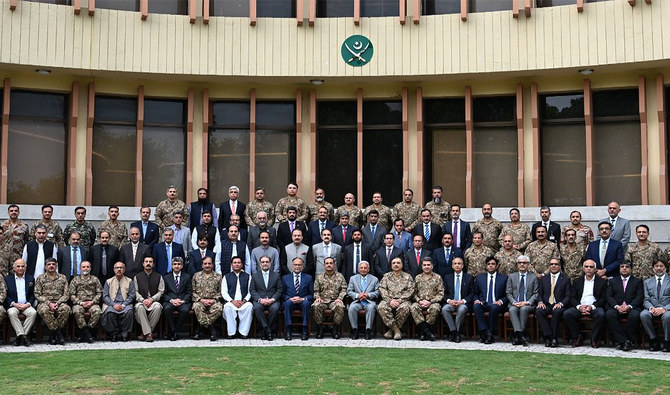
- General Asim Munir says army will continue to support the government with economic development of Pakistan
- He tells the gathering the military will provide comprehensive national security, work for Pakistan’s collective good
ISLAMABAD: Pakistan’s army chief General Asim Munir emphasized the importance of economic stability for a country to achieve full sovereignty while addressing the Green Pakistan Initiative conference on Friday, adding that his institution would continue to support the government in these efforts.
The initiative was launched as a response to the severe climate change impacts that Pakistan has faced over the years, including droughts, catastrophic floods, and extreme heatwaves. The program aims not only to mitigate the effects of erratic weather patterns by improving forest cover and restoring the ecosystem but also enhance the country’s resilience against future climatic shocks.
Pakistan has witnessed a growing awareness about the nexus between environmental issues and national security, prompting various sectors, including the military, to contribute to such green efforts.
“Pakistan is a blessed land with an industrious and resilient nation which needs to come together for national development,” the military’s media wing, ISPR, quoted the army chief in a statement circulated after the conference.
“Pakistan Army will continue to provide all possible support for the economic development of Pakistan,” he continued while pointing out the efforts of his institution to provide comprehensive national security and work for the collective good of the nation.
The state-owned PTV News reported the army chief warned all those who were trying to stop the country from progressing that their efforts would be wasted.
“In today’s era, the concept of complete sovereignty is not possible without economic stability,” he added.
Senior members of Pakistan’s federal cabinet were also present at the conference.
The participants reviewed the progress made under the initiative, expressing satisfaction that the country had achieved significant milestones under the program by establishing model farms, launching water management schemes and enhancing agricultural productivity.
What We Are Reading Today: Spiderweb Capitalism: How Global Elites Exploit Frontier Markets

- Hoang reveals the strategies behind spiderweb capitalism and examines the moral dilemmas of making money in legal, financial, and political gray zones
Author: Kimberly Kay Hoang
In 2015, the anonymous leak of the Panama Papers brought to light millions of financial and legal documents exposing how the superrich hide their money using complex webs of offshore vehicles. Spiderweb Capitalism takes you inside this shadow economy, uncovering the mechanics behind the invisible, mundane networks of lawyers, accountants, company secretaries, and fixers who facilitate the illicit movement of wealth across borders and around the globe.
Kimberly Kay Hoang traveled more than 350,000 miles and conducted hundreds of in-depth interviews with private wealth managers, fund managers, entrepreneurs, C-suite executives, bankers, auditors, and other financial professionals. She traces the flow of capital from offshore funds in places like the Cayman Islands, Samoa, and Panama to special-purpose vehicles and holding companies in Singapore and Hong Kong, and how it finds its way into risky markets onshore in Vietnam and Myanmar.
Hoang reveals the strategies behind spiderweb capitalism and examines the moral dilemmas of making money in legal, financial, and political gray zones.
Dazzlingly written, Spiderweb Capitalism sheds critical light on how global elites capitalize on risky frontier markets, and deepens our understanding of the paradoxical ways in which global economic growth is sustained through states where the line separating the legal from the corrupt is not always clear.
Lawyer for arrested Palestinian academic warns move could set ‘precedent’ for free speech in Israel
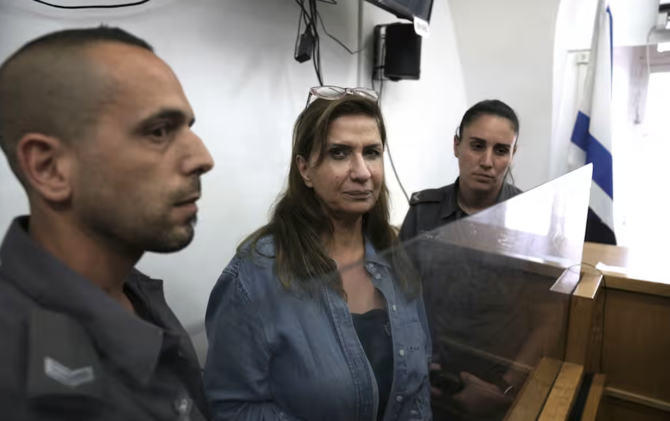
- Nadera Shalhoub-Kevorkian was detained for appearing on podcast to discuss state violence, genocide
- Hundreds of Palestinian citizens of Israel have been detained since Oct. 7 over criticism of Israel
LONDON: The lawyers for a Palestinian legal scholar arrested on April 17 have said her detention was “political” and could set a “precedent” for the treatment of academics and free speech in Israel.
Prof. Nadera Shalhoub-Kevorkian, a leading feminist academic with roles at the Hebrew University of Jerusalem and Queen Mary, University of London, was arrested after appearing on a podcast in March in which she discussed her work on state crimes, genocide, violence and surveillance in the context of the war in Gaza.
She was strip-searched by police, interrogated and denied access to food, water and medication for several hours, and held in a cold cell overnight before being bailed the next day. A number of her personal items, including posters and books, were also confiscated.
Hassan Jabareen, her lawyer and director of human rights organization Adalah, said: “This is not only about one professor, it could be a (precedent) for any academic who goes against the consensus in wartime.”
Israeli police claimed that she was being investigated on suspicion of incitement to terrorism, violence and racism, but a magistrate deemed she did not pose a threat after she was arrested, leading to her release.
Hundreds of Palestinian citizens of Israel have been arrested since the outbreak of hostilities after Oct. 7, with many detained for criticism of Israel.
All arrests in relation to freedom of speech issues must be signed off by Israel’s attorney general, and Shalhoub-Kevorkian has been ordered to return to face further questioning at the weekend.
Jabareen said: “They could have asked her to come to the police station for two or three hours to discuss, investigate.
“To carry out the arrest like that, as if she was a dangerous person, shows the main purpose was to humiliate her.
“It was illegal, that’s why the magistrates court accepted my argument that she should be released and the district court confirmed it.”
She added: “If they indict her, this might have a deeply chilling effect. It’s very difficult to prosecute a person for academic work … but the political situation in Israel is starting to not really be based on the rule of law.”
International academics have condemned Shalhoub-Kevorkian’s arrest and treatment, with over 100 colleagues from the Hebrew University of Jerusalem publishing a letter in support of her.
In addition, 250 academics at Queen Mary have signed a separate letter saying: “Academic freedom (in Israel) has come under sustained attack.”
In the Hebrew University academics’ letter, published by Israeli newspaper Haaretz, her colleagues said: “Regardless of the content of Nadera’s words, their interpretation and the opinions she expressed, it is clear to everyone that this is a political arrest, the whole purpose of which is to gag mouths and limit freedom of expression. Today it is Nadera who stands on the bench, and tomorrow it is each and every one of us.”
The Hebrew University also issued a short statement of support, despite the fact that in 2023 she was briefly suspended and asked to resign by the university’s rector after she called for a ceasefire in Gaza and suggested Israel could be guilty of genocide.
“We strongly object to many of the things that Prof. Shalhoub-Kevorkian said. Nonetheless, as a democratic country, there is no place to arrest a person for such remarks, however infuriating they may be,” it said.
Philippine police kill an Abu Sayyaf militant implicated in 15 beheadings and other atrocities
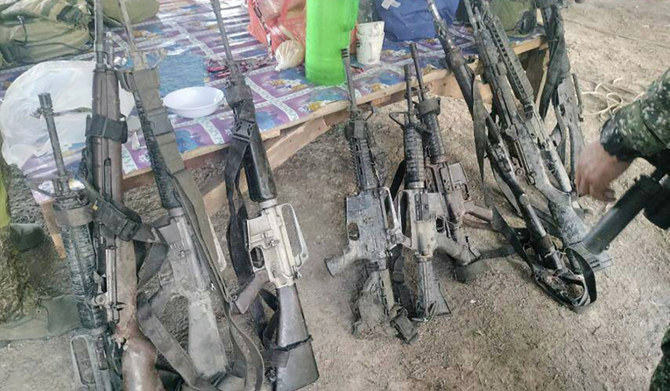
- A confidential police report said that Abdulsaid had been implicated in at least 15 beheadings in Basilan, including of 10 Philippine marines in Al-Barka town in 2007 and two of six kidnapped Vietnamese sailors near Sumisip town in 2016
MANILA: Philippine forces killed an Abu Sayyaf militant, who had been implicated in past beheadings, including of 10 Filipino marines and two kidnapped Vietnamese, in a clash in the south, police officials said Friday.
Philippine police, backed by military intelligence agents, killed Nawapi Abdulsaid in a brief gunbattle Wednesday night in the remote coastal town of Hadji Mohammad Ajul on Basilan island after weeks of surveillance, security officials said.
Abu Sayyaf is a small but violent armed Muslim group, which has been blacklisted by the US and the Philippines as a terrorist organization for ransom kidnappings, beheadings, bombings and other bloody attacks. It has been considerably weakened by battle setbacks, surrenders and infighting, but remains a security threat particularly in the southern Philippines, home to minority Muslims in the predominantly Roman Catholic nation.
Abdulsaid, who used the nom de guerre Khatan, was one of several Abu Sayyaf militants who aligned themselves with the Daesh group.
A confidential police report said that Abdulsaid had been implicated in at least 15 beheadings in Basilan, including of 10 Philippine marines in Al-Barka town in 2007 and two of six kidnapped Vietnamese sailors near Sumisip town in 2016. The Vietnamese were seized from a passing cargo ship.
He was also involved in attacks against government forces in 2022 and a bombing in November that killed two pro-government militiamen and wounded two others in Basilan, the report said.
Abdulsaid was placed under surveillance in February, but police forces couldn’t immediately move to make a arrest because of the “hostile nature” of the area where he was eventually gunned down, according to the report.
On Monday, Philippine troops killed the leader of another Muslim rebel group and 11 of his men blamed for past bombings and extortion in a separate clash in a marshy hinterland in Datu Saudi Ampatuan town in southern Maguindanao del Sur province, the military said.
Seven soldiers were wounded in the clash with the members of the Bangsamoro Islamic Freedom Fighters.
The Abu Sayyaf and the Bangsamoro Islamic Freedom Fighters are among a few small armed groups still struggling to wage a separatist uprising in the southern Philippines.
The largest armed separatist group, the Moro Islamic Liberation Front, signed a 2014 peace pact with the government that eased decades of sporadic fighting.
Moro Islamic Liberation Front rebel commanders became parliamentarians and administrators of a five-province Muslim autonomous region in a transition arrangement after signing the peace deal. They are preparing for a regular election scheduled for next year.



